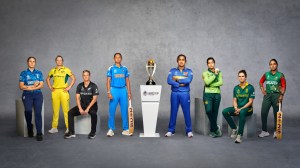Click here to follow Screen Digital on YouTube and stay updated with the latest from the world of cinema.
What could Netflix’s The Archies learn from the provocative Class?
Zoya Akhtar’s Netflix-backed, coming-of-age musical somewhere loses grip of the reality and relatability that previously made Netflix’s Class such a provocative, yet memorable watch.
 The Archies was recently released on Netflix.
The Archies was recently released on Netflix.In the past decade or so, Zoya Akhtar, the younger of the Akhtar siblings and the daughter of famed lyricst and screenwriter Javed Akhtar has most definitively established herself as one of the most distinct voices to have emerged out of the Hindi film industry in this century. Her films have not only polarised the box-office but garnered critical acclaim. Whether she now proceeds to direct, write or just produce a film for the theatres or the digital space, one thing is for sure – she is not a force to be ignored. Over the years, one has also come to distinguish the Zoya Akhtar school of film-making — there is, of course, the ensemble cast, the lavish production values, the clinically precise gaze of the camera and as some haters love to call it, an affinity to tell stories about the lives of the urban rich in India. But beyond the surface trappings of these details. Zoya’s films have always been driven by a deeply rounded human voice that has more often than not, opted to press a point home by dealing in quieter nuances as opposed to using a sledgehammer.
I am, unfortunately, not of the generation that grew up reading the Archie comics. The Archie universe was something that came into my life in the form of stray and frayed comic books that I often found from my father’s trunks during cleaning days. Although I spent much of my younger days immersing myself thoroughly into the Tintin and Astrix universe, the Archies was something I never really warmed up to. Until, the CBC show Riverdale, starring the inhumanly gorgeous cast of KJ Apa, Cole Sprouse, Camilla Mendes and Lili Reinhart walked into our lives. Earlier I have only heard of the perpetually hungry Jughead and the musician Archie who had the hots for the rich Veronica and the girl-next-door Betty. CBS’s Riverdale, despite an eventual deep dive into aliens and time-travel, was initially rooted in a premise that attempted to take the archetypes of these familiar characters and ground them in a modern day reality – which was oftentimes dark. Hence the announcement of The Archies, backed by Netflix and directed and helmed by Zoya Akhtar had me waiting with bated breath – ever since its announcement.
With a remarkably famous ensemble cast, and top production values, Zoya’s take on the Archie comics was supposed to be an auteur’s take on a familiar set of characters and plot points. Case in point, Tim Burton’s take on Lewis Carrol’s Alice In Wonderland, which breathed an absolutely unforeseen visual life into the dreamscape of the young girl Alice. Set in 1960s India and centered around the Anglo-Indian community, Akhtar’s film too had expectations high – and rightfully so. The 1960s was a deeply volatile time for India. On the heels of its recently acquired freedom, there was abject violence across the country on grounds of state-reorganistion schemes, there was the threat of war looming from neighbouring countries and the perpetually hanging question of uniting such a vast country of melting cultural values under the umbrella identity of one Nation State. Add to this mix, a bunch of teenage misfits who come-of-age and grapple with questions of identity, love, belonging and heartbreak and you have got yourself material that is inflammable.
However, Akhtar’s plush reimagining of the comicverse is nowhere near fiery. Grounding a story in layers of nostalgia and innocence does not necessarily translate into bad cinema. Some of our greatest films, across languages, have been explorations of the innocence and nostalgia that populates childhood. But the selling point of nostalgia comes from an idea of relatedness. Nostalgia works when a desire for something tangible, now lost to the folds of time forever, is evoked. And that is the film’s biggest failure. The Archies, despite a clever and sugary conceit, is grounded in such a twilight-zone of plasticity that the film despite its two and half hour long run-time falls desperately short of finding its footing.
But neither does the film choose a Saawariya route to tackle the problem. Bhansali’s blue anti-love story began with a Rani Mukherji chuckling and claiming that the story is set in a “khwabon ka sheher”. Here too Archie Andrews (played by a largely charming Agastya Nanda) tells us that the town of Riverdale is located beyond the clouds, in the heart of the hills. This is a piece of information that is brought to us immediately after a curiously animated opening sequence that makes us dive into the history of the town itself. But over the course of the film I found myself asking the following questions – which town is this? Is it Darjeeling or is it Mussorie? Is this a hill-station from Western or Eastern India? How are these people not interacting with any non-Anglo Indian locals in the town? If this is the 60s and the Council for School Certificate Examinations has already been established by some of the leading Anglo-Indian educators of our country, then what are these children studying at school? Despite a series of pop-culture references – Reggie clad in his leather jacket has a balm in a box called “Grease”, Archie namedrops the Beatles and Cliff Richards like Delhi University rappers speak about AP Dhillon, Ethel’s boss and the owner of Pam’s jokes about Shammi Kapoor and Betty’s father makes a stray reference to a new chap called Ruskin Bond – this film seems surprisingly removed from reality.
Earlier this year, Netlix released its adaptation of the famous Spanish series Elite, which was renamed as Class. A provocative and stark depiction of the lives of teenagers attending an elite international school in urban Delhi, Ashim Ahluwalia’s Class too launched an ensemble of first-time actors. Despite sloppy writing in patches and a story-line that gets too convoluted too fast, the reason why Class worked was because it was informed by an urban lived reality. At one point in The Archies, Archie’s father Fred has a conversation with his son about being a minority in this country. He quietly says that despite not being ethnically Indian in the truest sense of the race, this was and will forever be their “mulk”. The line, at a glance seems misplaced in a film that is more concerned about strawberry shakes and confused teenage boys. But crack the surface and you see the reason why this line is there – this is also a story that is desperately trying to make a case for an entire generation of people who began to leave the country in search of greener pastures leading to the eventual brain drain of the 1970s and 80s. But this sentiment is never engaged further in the film. What truly is it like being a minority in this country, especially an Anglo-Indian (Having grown up in Kolkata myself, I know for a fact that some sections of the community have had extremely tenuous lives across generations), is never explored further.
Where Akhtar’s film only grazes the surface, Ahluwalia’s series quite literally bit the dust.The show’s protagonists Dheeraj and Saba represengt caste and religious minorities in India, and it is something that they are repeatedly reminded of over the course of the series. From their first moments in the new school, they are made aware of the fact – that their admission is solely to satisfy CSR needs on part of the school, and their merit notwithstanding, they will always remain outsiders. The argument is pushed forward in an even thornier scene where Yashika, played by the impeccable Ayesha Kanga, accosts their teacher and puts to question his decision to award Saba over her. The earlier Netflix release also went where very few international shows, let alone Indian ones tread – the realm of the nerd. In the character of Yashika, we finally got a “cool” girl who was also acing her academics and dreamt of making it big after her high school. This is a lived reality of thousands of students in the metropolitan cities of this country. Girls and boys who come from dysfunctional family backgrounds, party all day, live the life of an influencer and yet manage to ace their academics. Through Yashika, the nerd at once not just became the central topic of conversation but also became someone who was cool, and hence aspirational. And it is in the face of such characterisation, that the thinly written characters of Veronica and Betty fall flat.
Suhana Khan is tremendously good in some of her scenes as Veronica. But the screenplay barely offers her any scope to add any semblance of nuance to the character. We see her cry next to her Christmas presents, in an empty mansion. We see her make up with her best friend, after being upset with her within the span of a few stray minutes. While the ease and panache of these transitions and the sugar plum resolutions to all these driving conflicts of the film are an interesting addition to the Akhtar-verse, they belie the very tenets that initially shot Akhtar to overnight fame. The fact that girlhood and boyhood, and coming of age, in general, is a tricky and often-times thorny process. In Dil Dhadakne Do, Ayesha’s beauty lies not just in her entrepreneurship but in the quietly slipped in detail that despite coming from business royalty, she had to sell her own jewellery to begin her start-up. A similar sense of nuanced poignancy seems desperately missing in this film.
Earlier this year, Greta Gerwig’s Barbie too attempted to make a real-life narrative of a literal piece of plastic. But Gerwig’s saving grace lay in the film’s self-reflexive understanding of its own plasticity, which Akhtar’s narrative deliberately attempts to resist. Despite the musical structure and the sun-drenched interiors, the film insists on being posited as being rooted in a reality of an era gone by. But nostalgia can only be evoked through a reality that is lived-in, that is familiar. And Akhtar’s film never seems to find this reality it claims to revisit.
There’s a lot of potential in Netflix’s second teen-drama of the year. But I wish it had learnt from the provocative risks its predecessor took earlier this year.




- 01
- 02
- 03
- 04
- 05






























